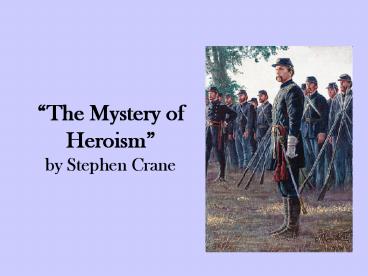The Mystery of Heroism by Stephen Crane PowerPoint PPT Presentation
1 / 33
Title: The Mystery of Heroism by Stephen Crane
1
The Mystery of Heroismby Stephen Crane
2
Figurative LanguageSimile, Metaphor
Personification You should know these
definitions.
3
What example of figurative language is used
below After Tim found out Mr. Rydzik knew that
he cheated on the test he turned as white as a
ghost.
Simile What two things are being compared?
4
What example of figurative language is used
below The drought-stricken basketball team did
not make a shot for an entire first quarter.
Metaphor What two things are being compared?
5
What example of figurative language is used
below You can tell by her senior pictures that
the camera loves Jessica.
Personification How is this being done?
6
What type of mood does the setting provide?
7
The Concept of Irony
- Dramatic Irony
- Something is known by the audience but unknown to
the characters - Verbal Irony
- A statement is made that implies its opposite
- Irony of Situation
- An event occurs that violates the expectations of
the characters, the reader, or the audience
8
Elements of Realism
Portraits of everyday life Grim
depictions Unsavory characters Protagonists are
ordinary people
9
Elements of Realism
Settings are important Stories are usually cause
and effect Stories can be shocking
10
Realism in the visual arts and literature is the
depiction of subjects as they appear in everyday
life, without embellishment or interpretation it
also describes works of art which, in revealing a
truth, may emphasize the ugly or sordid.
Elements of Realism
11
Realism in photographs
Dead Confederate Sharpshooter in the Devil's Den
- Gettysburg
12
In most people's minds, the years following the
Civil War symbolized a time of healing and
rebuilding. In literary circles, however, the
period was full of upheaval. A literary civil war
raged on between the camps of the romantics and
the realists and later, the naturalists. People
waged verbal battles over the ways that fictional
characters were presented in relation to their
external world.
13
Using plot and character development, a writer
stated his or her philosophy about how much
control mankind had over his own destiny. These
American realists believed that humanity's
freedom of choice was limited by the power of
outside forces. Naturalists argued that
individuals have no choice because a person's
life is dictated by heredity and the external
environment.
14
(No Transcript)
15
What is Naturalism?
It was a literary movement that saw actions and
events as resulting inevitably from biological
or natural forces in the environment.
Characters are governed by the forces of
heredity, instinct, and passion.
16
What is Naturalism?
The "brute within" concept strong, emotional,
and passionate characters that can be filled with
qualities such as lust, greed, or the desire for
dominance or pleasure and the fight for survival
in an amoral, indifferent universe.
17
Emergence of Realism
- Drew portraits from real-life
- Shocked readers with grim depictions
- A realistic use of dialects and local color
- Use of satire or irony often present
- Breakdown of traditional values
- Misery of the poor or urban America
18
Emergence of Naturalism
- An extension of Realism
- Peoples actions and beliefs did not result from
free will - Arbitrary outside forces of heredity and
environment - Human behavior based on instinct
- Humans as pawns manipulated by cruel indifferent
forces
19
Quiz Clues
- How is the philosophy of Realism exhibited in the
story? - Does the story exhibit the traits of Naturalism
within its characters? - Does heroism exist in this story?
- How does the setting affect the telling of the
story? - How does irony exist in this story?
20
Quiz Clues
- Be able to identify uses of figurative language
- What is the mood of the story?
- Who is responsible for the protagonists actions?
21
Vocabulary
- Battery
- Blanched
- Conflagration
- Convulsive
- Furtive
- Genial
- Gesticulating
- Imprecation
- incessant
- Indolent
- Ominous
- Pious
- Provisional
- Stolidity
- sullen
22
The industrial revolution that took place at the
end of the 19th century changed our country in
remarkable ways.
23
People left rural homes for opportunities in
urban cities. With the development of new
machinery and equipment, the U.S. economy became
more focused on factory production Americans did
not have to chiefly rely on farming and
agriculture to support their families.
24
At the same time, immigrants from all over the
world crowded into tenements to take advantage of
new urban opportunities.
25
In the end, the sweeping economic, social, and
political changes that took place in post-war
life allowed American Realism to prevail.
26
(No Transcript)
27
(No Transcript)
28
(No Transcript)
29
(No Transcript)
30
(No Transcript)
31
(No Transcript)
32
(No Transcript)
33
(No Transcript)

